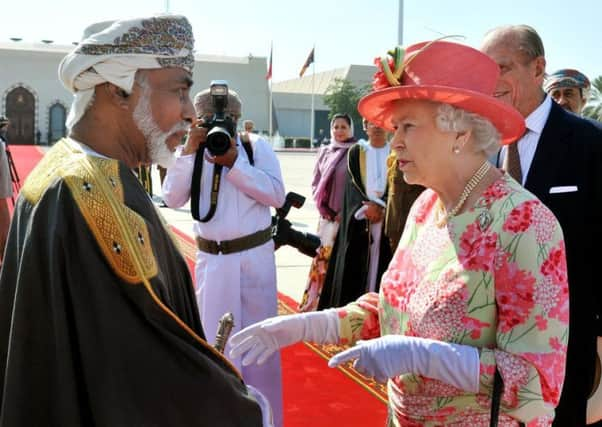Obituary: Sultan Qaboos bin Said, ruler of Oman, moderniser, peacemaker and reformer


Oman’s Sultan Qaboos bin Said, the Mideast’s longest-ruling monarch who seized power in a 1970 palace coup and pulled his Arabian sultanate into modernity while carefully balancing diplomatic ties between adversaries Iran and the US, has died. He was 79.
The British-educated, reclusive sultan reformed a nation that was home to only three schools and harsh laws banning electricity, radios, eyeglasses and even umbrellas when he took the throne.
Advertisement
Hide AdAdvertisement
Hide AdUnder his reign, Oman became known as a welcoming tourist destination and a key Mideast interlocutor, helping the US free captives in Iran and Yemen and even hosting visits by Israeli officials while pushing back on their occupation of land Palestinians want for a future state.
“We do not have any conflicts and we do not put fuel on the fire when our opinion does not agree with someone,” Sultan Qaboos told a Kuwaiti newspaper in a rare interview in 2008.
Oman’s state-run news agency announced his death last Saturday, but offered no cause. The royal court declared three days of mourning. Following Islamic tradition, the sultan was buried before nightfall.
The sultan’s death had raised the risk of unrest in this country on the eastern edge of the Arabian Peninsula. The unmarried Sultan Qaboos had no children and did not publicly name an heir, a tradition among the ruling Al Said dynasty whose history is replete with bloody takeovers. But within hours, Oman state television announced Haitham bin Tariq Al Said, who had served as the sultanate’s culture minister, as the new sultan.
Oman’s longtime willingness to strike its own path frustrated Saudi Arabia and the United Arab Emirates, longtime foes of Iran who now dominate the politics of regional Gulf Arab nations. How Oman will respond to pressures both external and internal in a nation Sultan Qaboos absolutely ruled for decades remains in question.
“Maintaining this sort of equidistant type of relationship… is going to be put to the test,” said Gary . Grappo, a former US ambassador to Oman. “Whoever that person is is going to have an immensely, immensely difficult job. And overhanging all of that will be the sense that he’s not Qaboos because those are impossible shoes to fill.”
The sultan had been believed to be ill for some time, though authorities never disclosed what malady he faced..
The sultan’s willingness to stand apart was key to Oman’s influence in the region. While home only to some 4.6 million people and smaller oil reserves than its neighbors, Oman under Sultan Qaboos routinely influenced the region in ways others couldn’t.
Advertisement
Hide AdAdvertisement
Hide AdOman’s oil minister routinely criticises the policies of the Saudi-led OPEC oil cartel with a smile. Muscat hosts meetings of Yemen’s Houthi rebels, locked in a years-long bloody war with Saudi Arabia. When Americans or dual nationals with Western ties are detained in Iran or areas under Tehran’s influence, communiques that later announce their freedom routinely credit Oman’s help.
The sultan’s greatest diplomatic achievement came as Oman hosted secret talks between Iranian and US diplomats that led to the 2015 nuclear deal between Tehran and world powers. The agreement, which limited Iran’s atomic programme in exchange for the lifting of economic sanctions, has come unraveled since President Donald Trump withdrew from it in May 2018.
Even while mediating negotiations with Tehran, the sultan maintained ties to those in the Pahlavi dynasty that Iran’s 1979 Islamic Revolution overthrew.
US President Donald Trump issued a statement saying that the sultan “brought peace and prosperity to his country and was a friend to all. His unprecedented efforts to engage in dialogue and achieve peace in the region showed us the importance of listening to all viewpoints.”
Former President Jimmy Carter also expressed sadness, saying: “His voice for peace and tolerance in the Middle East will be missed. He was a wise counsel and ally to me in the White House.”
Sultan Qaboos’ outward-looking worldview could not have contrasted more sharply than that of his father, Sultan Said bin Taimur, under whose rule the sultanate more resembled a medieval state. Slavery was legal, no one could travel abroad and music was banned.
Yet Sultan Said let his son Qaboos, born in Salalah on 18 November, 1940, travel to study in England. Qaboos’ time abroad included schooling at Britain’s Royal Military Academy at Sandhurst and training with the Scottish Rifles Regiment in what was then West Germany.
Qaboos returned to Salalah in 1964 but found himself instead locked away in a palace. A 23 July, 1970 palace coup ended up with Sultan Said shooting himself in the foot before going into exile in London. Qaboos took power.
Advertisement
Hide AdAdvertisement
Hide Ad“Yesterday, Oman was in darkness,” Sultan Qaboos said after the coup. “But tomorrow, a new dawn will rise for Oman and its people.”
Sultan Qaboos quickly moved toward modernising the country, building schools, hospitals and roads.
Over time, Sultan Qaboos introduced what amounted to a written constitution, created a parliament and granted citizens limited political freedoms. But the sultan always had final say. Oman was one of the few countries in the Arab world to maintain ties with Egypt after Egyptian President Anwar Sadat signed a peace treaty with Israel in 1979, and acted as a mediator between Iran and Iraq during their ruinous eight-year war. It has also long served as a quiet base for US military operations.
As he grew older, Sultan Qaboos also grew increasingly reclusive. He is known to have had three major passions – reading, music and yachting.
He “read voraciously,” Grappo said, played the organ and lute. He created a symphony orchestra and opened a royal opera house in Muscat in 2011. His yacht “Al Said” is among the world’s largest and was frequently seen anchored in Muscat’s harbour.
Sultan Qaboos was briefly married to a first cousin. They had no children and divorced in 1979.
ASSOCIATED PRESS